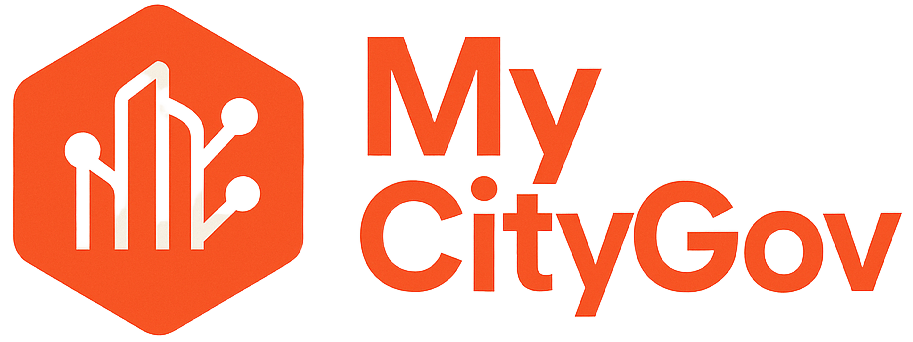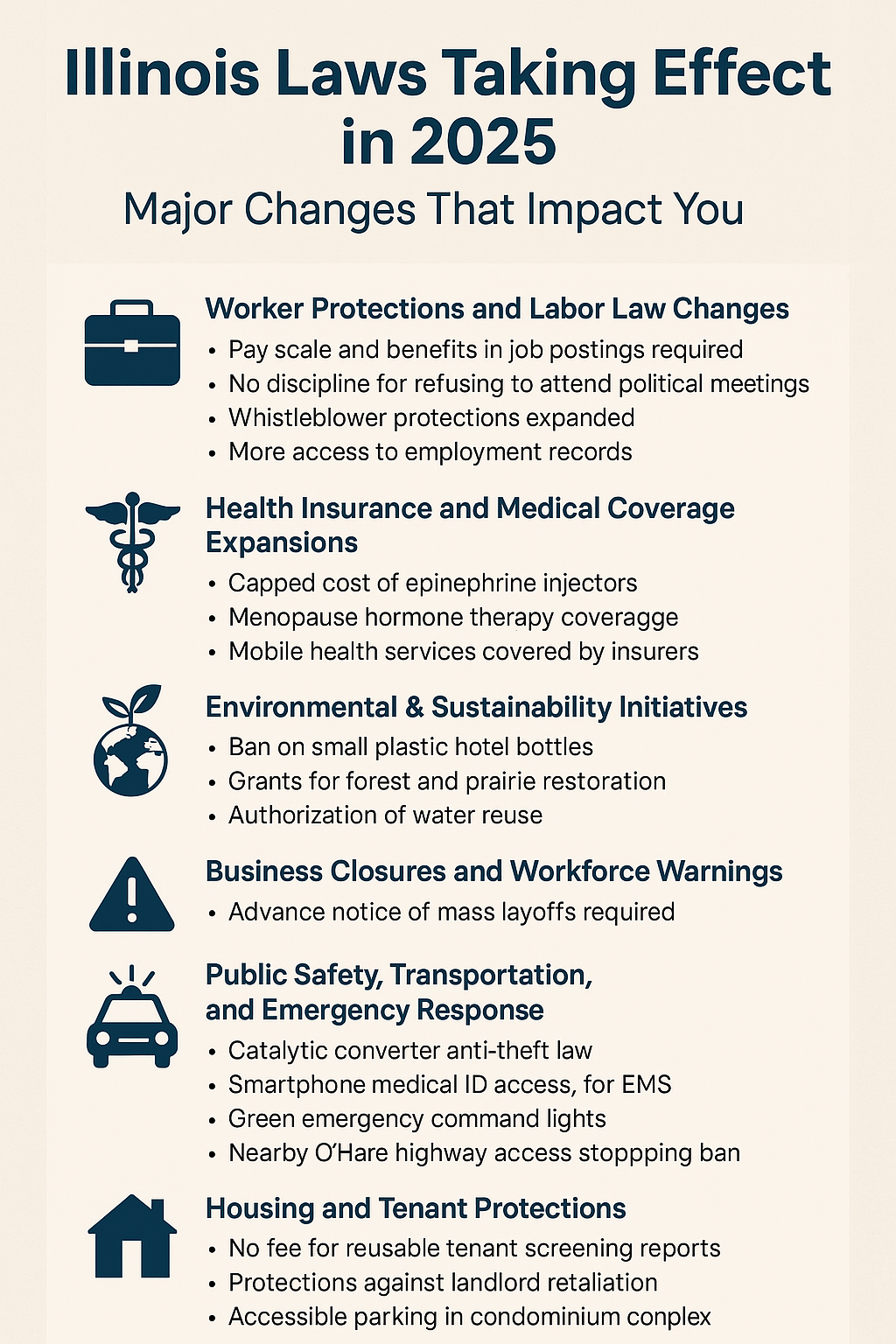Big shifts are coming to Illinois in 2025. From worker protections to environmental policies and public safety, new legislation is set to affect nearly every Illinoisan—whether you’re a business owner, public employee, homeowner, or simply a concerned citizen.
In this article, we’ll break down the most significant laws taking effect January 1, 2025, how they impact you, and what they reveal about the current state of the economy, workforce, and public priorities in Illinois.
Table of Contents
- Worker Protections and Labor Law Changes
- Health Insurance and Medical Coverage Expansions
- Environmental & Sustainability Initiatives
- Business Closures and Workforce Warnings
- Public Safety, Transportation, and Emergency Response
- Housing and Tenant Protections
- Digital ID and Data Privacy
- How to Stay Informed
Worker Protections and Labor Law Changes
Transparency in Job Postings
Beginning January 1, 2025, employers with 15 or more workers must include pay scale and benefits in job postings. If a third party posts the listing, they must also include that info. This is a major win for wage transparency and fairness in hiring.
Freedom from Forced Political Speech
Under the new Worker Freedom of Speech Act, employers cannot discipline or fire employees for refusing to attend meetings about political or religious beliefs. This law empowers employees to opt out of biased corporate communications.
Whistleblower Protections Strengthened
Updates to the Illinois Whistleblower Act protect employees who report unsafe or illegal activities in the workplace. It clarifies what qualifies as retaliatory action and expands definitions to better defend vulnerable workers.
Expanded Personnel Rights
Employees now have more access to their employment records—including contracts and binding agreements. Employers must provide access within 21 days of a written request.
Health Insurance and Medical Coverage Expansions
Illinois is enacting sweeping health-related reforms in 2025, including:
- Epinephrine Injector Cap: Twin-packs of EpiPens now capped at $60 out-of-pocket.
- Menopause Hormone Therapy: Required coverage, whether due to hysterectomy or not.
- Mental Health Coverage: Mandatory for first responders and couples’ therapy for public safety personnel.
- Pregnancy and Miscarriage Support: Coverage for mental health services after stillbirth or miscarriage.
- Colonoscopy Access: Mandated insurance coverage if deemed medically necessary.
- Molecular Breast Imaging: Covered if a mammogram shows dense breast tissue.
- Mobile Health Services: Required coverage for integrated mobile health services.
These reforms reflect a growing prioritization of preventative care, mental health support, and equitable access to care across Illinois.
Environmental & Sustainability Initiatives
Several groundbreaking environmental laws take effect:
- Clean Lighting Act: Phases out the sale of compact fluorescent lamps, favoring LEDs and efficiency.
- Forest, Wetlands & Prairies Grant Program: Local governments can get funding to restore ecosystems and fight climate change.
- Water Reuse Authorization: Treated municipal wastewater may now be used for irrigation.
- Paint Recycling & Waste Management: New paint stewardship programs begin in 2025.
- Ban on Small Plastic Hotel Bottles: Hotels must eliminate small single-use plastics starting mid-2025.
- Legacy Tree Program: A task force will now identify and protect significant trees statewide.
These efforts reflect Illinois’ dual focus on conservation and combating climate change through policy.
Business Closures and Economic Warning Signs
While progressive legislation is hitting the books, economic data paints a troubling picture.
In November 2024, nearly 9 in 10 Illinois layoffs were due to businesses permanently closing their doors, according to Illinois Policy Institute. That’s 14,285 of 16,292 job losses, or 88%.
This alarming stat shows that Illinois isn’t just seeing layoffs due to restructuring—it’s seeing outright exits. The result? Fewer opportunities and diminished local economies.
Key takeaways:
- The manufacturing and hospitality sectors were hit hardest.
- These closures often happen in regions already struggling with economic development.
- Policymakers should prioritize retention, not just regulation.
If you’re a business owner or economic developer, this is your cue: prepare now for economic headwinds.
Public Safety, Transportation, and Emergency Response
Several new laws aim to make Illinois safer and more efficient:
- Catalytic Converter Crackdown: Scrap dealers must now record vehicle VINs and titles to prevent theft.
- EMS Tech Upgrades: EMS and law enforcement will be trained to access smartphone medical ID apps.
- Green Emergency Lights: Now permitted for emergency operations command posts.
- Driver Safety Near O’Hare: A new law prohibits stopping within 2 miles of O’Hare’s highway access points to curb traffic hazards.
- Mandatory Crash Notifications: Drivers must report accidents involving injuries or school buses—even without police presence.
These laws aim to modernize public safety response and reduce risks in everyday travel.
Housing and Tenant Protections
Tenants and landlords alike face new rules in 2025:
- No Screening Fee for Tenants Using Verified Reports: Landlords can’t charge fees if a renter provides a reusable tenant screening report.
- Landlord Retaliation Act: Tenants are now protected against retaliatory evictions or rent hikes after complaints or legal action.
- Accessible Parking in Condos: Condominium boards must now make “reasonable accommodations” for disabled residents needing parking access.
This push toward housing equity reflects the state’s broader commitment to protecting vulnerable renters and residents.
Digital ID, Utilities & Data Privacy
- Mobile Driver’s Licenses: The Secretary of State may now issue digital ID cards and driver’s licenses. Physical ID must still be accepted.
- Water Disruption Notifications: Utilities must notify first responders of planned or unplanned outages.
- Predictive Analytics Law (Effective 2026): Employers can’t use zip code or race proxies in hiring algorithms—promoting fair AI practices in recruitment.
Illinois continues to walk the tightrope between innovation and privacy, focusing on responsible tech regulation.
How to Stay Informed
Want to keep up with new legislation and how it may affect your life or business? Here’s how:
- Bookmark the Illinois General Assembly website
- Subscribe to newsletters from Illinois Policy Institute
- Follow updates from the Illinois Municipal League
- Talk to your local city council or board—many of these laws affect municipal services
Final Thoughts: Progress or Pressure?
Illinois’ 2025 laws reveal a state at a crossroads:
- On one hand, these new laws show progress—greater equity, sustainability, and safety.
- On the other, the wave of business closures reveals the challenges still ahead for the economy.
Balancing rights with responsibility, regulation with retention, will be key in the year ahead.
Are you a local business, nonprofit, or municipality? Now’s the time to prepare. Review your policies, train your staff, and stay ahead of the legal curve.


